Event Report “Meet Up with the Social Innovator”
Discussion with social innovators to create a better world
On September 3, 2021, Fujitsu-JAIMS held this event as a place for consultation on the issue social innovators face and the ideas they seek in order to accelerate their activities.
Social Innovator × Business
The more accelerate innovator’s activity,
The more accelerate a better future
Since 2013, JAIMS has been offering an international management program “Global Leaders for Innovation and Knowledge (GLIK)” based on a multi-campus network with a global perspective. GLIK has provided practical and educational programs to nurture innovation leaders, who are trying to solve social issues to build a better future beyond borders. During the 3.5 months GLIK program, called “Capstone Project”, each participant develops an innovation plan to solve a social issue. There are roughly 240 Alumni in total who are very active in various fields.
However, after completing GLIK, JAIMS Alumni have faced varied challenges at the stage of implementing the innovation plan. Therefore, JAIMS decided to set up an event for online discussions to support the activities of their graduates.
There are pioneers all over the world who are similarly challenging social issues. Starting with GLIK graduates and Fujitsu Group employees, the online event expected to become a place where they can discuss each other’s issue online and share their wisdom together.
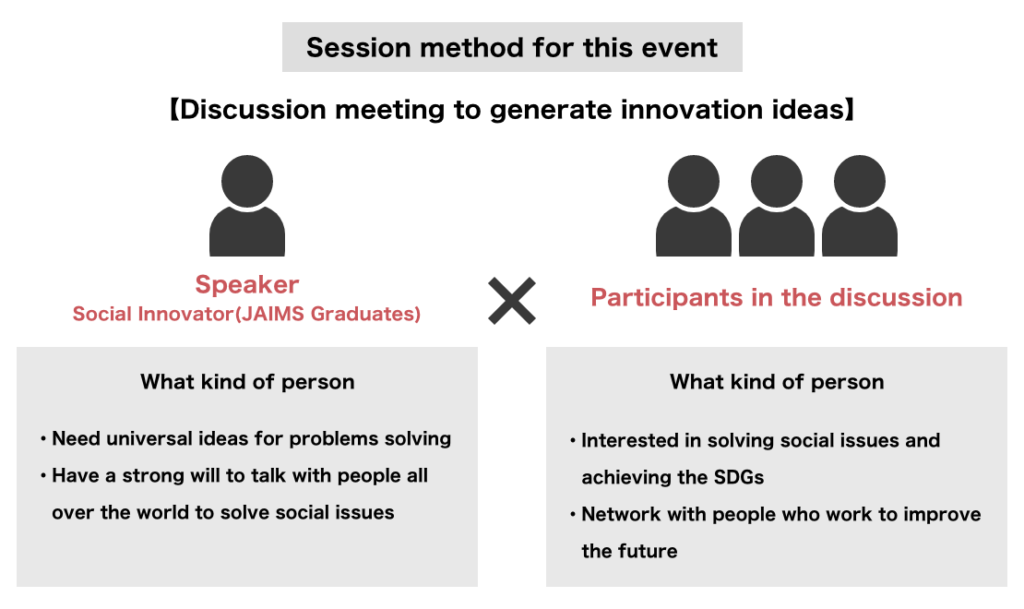
Event Overview
“Improving Thai Farmers’ Wellbeing and Enhance Food Safety
-producing a new business using organic vegetables- ”
19 participants from 7 countries discussed and shared their ideas
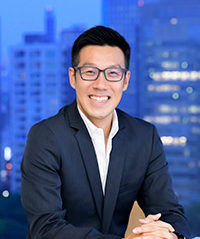
- Date : September 3rd,2021
- Participants : 19
- Speaker : Mr. Krittawit Krittayaruangroj (Chris)
JAIMS graduates/alumni on the 2019 Spring Course
CEO, Akelada Hotel & Convention
Founder, Safety Agri Buriram (SAB) by Akelada Hotel - Contents :
1. Opening remarks
2. Story Sharing from the speaker, Q/A
3. Group Discussion (3 to 5 people in each group)
4. Idea sharing from each groups, Q/A.
There was an application double the capacity. It may indicate a growing enthusiasm for discussing social issues. 19 people (from India, Indonesia, Japan, Malaysia, Myanmar, Philippines, and Taiwan) participated in the event on the day. Various people gathered, who want to make some contributions to the SDGs, or understand how to build an ecosystem and the reality of social issues.
Session highlights
The event started with Sharing Chris’s Story
“Improving Thai Farmers’ wellbeing and enhance food safety-Producing a new business using organic vegetables- ” was the theme of the first online event. The speaker was Mr. Krittawit Krittayaruangroj (Chris), one of JAIMS Alumni on the 2019 Spring Course.
Chris is from Buriram province, one of the prefectures in northeastern Thailand sharing borders with Cambodia. He wants to change the environment surrounding agriculture in his home country. The biggest challenge for Thai agriculture is poverty, one of the 17 goals of the SDGs.
The event began with Chris explaining the challenges facing Thai agriculture. The knowledge and background of the participants were different, so Chris thought it was necessary to share the premise first.
The biggest challenge for Thai agriculture is poverty
In Thailand, 10% of the total population is below the poverty line. And if we focus on farmers, half live below that. Agriculturalists make up 46% of Thailand’s population.
“Why are Thai Farmers poor?” Chris asked the participants.
He speculated that there were three causes of their poverty;
- Low productivity
They have poor soil maintenance and water resource management. - High cost of productions
90% of farmers misuse chemical fertilizers and pesticides as ill-informed excessive use of agrichemicals. - Lack of market knowledge
Farmers have no access to non-local agricultural markets, and don’t have any doubts about monoculture.
Become a pilot case not only in Thailand but also in neighboring developing countries
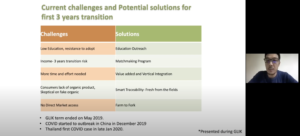
Aiming to improve the lives of Thai farmers in poverty, Chris is working on creating a farm-to-fork ecosystem. This involves not only encouraging and educating farmers in the cultivation of high value-added organic produce, but also promotes community-based tourism which includes serving meals featuring local organic vegetables to the hotel guests.
Now he is running the pilot case of the ecosystem with a resort run by his family in Buriram.
He also thought that if done well, it could be introduced in other parts of Thailand and other developing countries like Philippines, Malaysia, Indonesia as well.
Chris’s challenges: Sustainability cut off by COVID-19
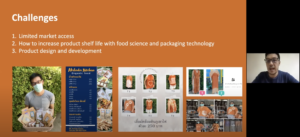
With his various attempts, the introduction of organic farming seemed to have begun to turn around. But due to the COVID-19 pandemic, this ecosystem has been impacted by the declination of visitors, and Chris is facing the challenges of not being able to fully utilize the harvested organic vegetables. He is now trying to open a new stream of income by developing value-added products using organic vegetables or new products or services.
Grouped discussions and presentations
Given this situation, participants were divided into 4 groups to share their opinions to bring in ideas for solutions on how to solve Chris’s situation.
People from different countries and positions evaded hot discussions. The time passed so quickly that some participants said they didn’t have enough time.
In the heated discussion, they noticed various things.
For example;
– One participant provided a discussion platform to activate discussions.
– They enjoyed various perspectives by listening to the ideas of people with diverse backgrounds.
– Not enough talk, they remained after the schedule and asked Chris questions to deepen their understanding.
Chris seemed to be greatly inspired by the presentations from the participants. He also got hints for next steps.
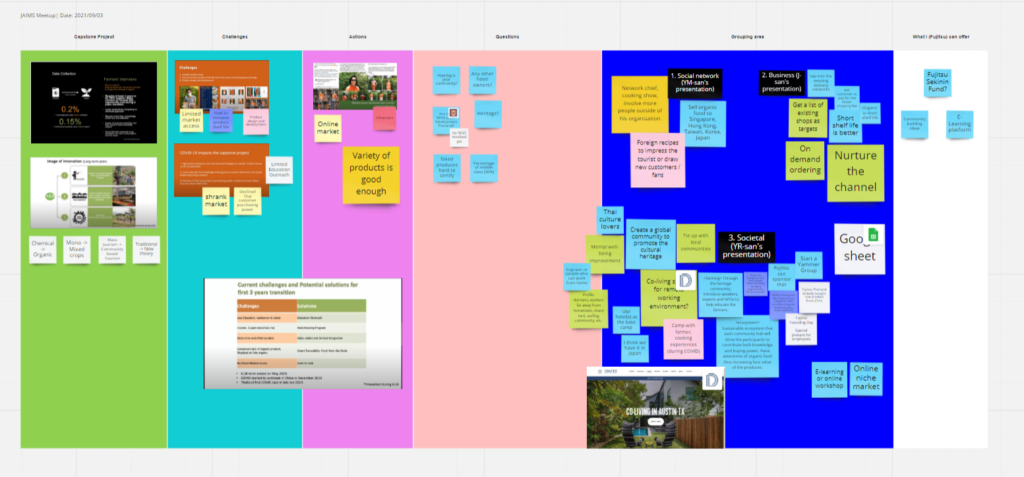
Impressions after the event
Impressive voice from participants
Favorable impressions were also received from the participants.
<This is the very good opportunity to know social issue in the world.>
<We can notice that we can find similar issue in my country even if today’s case is Thailand.>
<We could discuss by diverse participants and share their interesting ideas.>
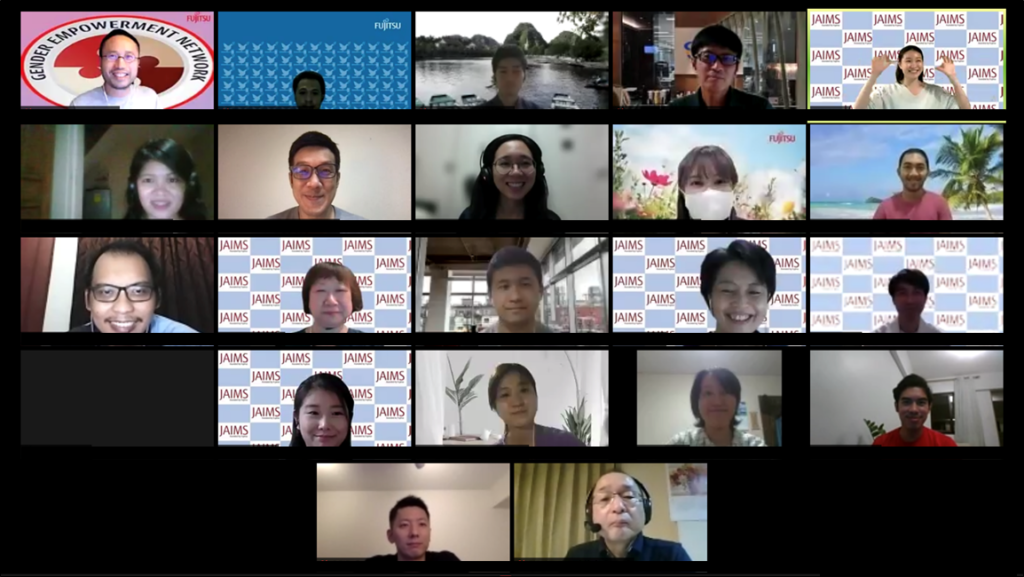
The event management side was also confident that it was the first step to continue working with GLIK Alumni to solve social issues. Participants uniformly realized the value of sharing social issues with people around the world through this event. After successfully completing the first session, this online event will continue to be held regularly.
